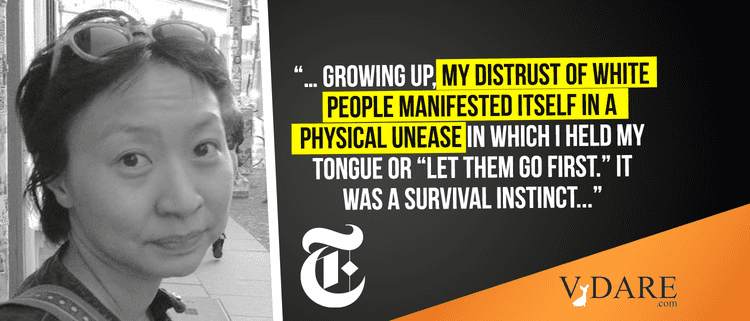


By Steve Sailer
04/16/2020
It feels like February again in the New York Times Magazine, with Korean-American lady writers milking their Google searches for anti-Chinese incidents for all they are worth:
The Slur I Never Expected to Hear in 2020
As an Asian-American, I’ve been conditioned to a certain kind of unspoken racism. This pandemic has unmasked how vicious it really is.By Cathy Park Hong [Tweet her]
April 12, 2020Early in February, I read unsupported speculations that a virus ravaging a distant city called Wuhan was due to a Chinese taste for a strange scaled mammal called the pangolin, which resembles an anteater but is cuddlier than its lumbering tube-snouted look-alike. Around that time, during a dinner party, I laughed when a friend quipped: “How do you eat a pangolin anyway? Do you dip its scales in butter like an artichoke?” When I tweeted that same joke the next day, a writer I knew responded, “It’s used for medicinal purposes.”
No, it’s not.
He was simply stating a fact, but I suddenly realized that I could be spreading stereotypes about Chinese people. I deleted the tweet with a reminder to self: Make fun of Asians only around other Asians.
… In the past, I had a habit of minimizing anti-Asian racism because it had been drilled into me early on that racism against Asians didn’t exist. Anytime that I raised concerns about a racial comment, I was told that it wasn’t racial. Anytime I brought up an anti-Asian incident, a white person interjected that it was a distraction from the more important issue (and there was always a more important issue). I’ve been conditioned to think my second-class citizenry was low on the scale of oppression and therefore not worth bringing up even though every single Asian-American I know has stories of being emasculated, fetishized, humiliated, underpaid, fired or demoted because of our racial identities.
… If black and indigenous people were systematically enslaved, killed and dispossessed of property, the Chinese were excluded from the U.S. altogether, an immigration ban that was essentially a form of global segregation. …
“I’m afraid to leave my home not because of coronavirus,” my Asian friends say, half in jest, “but because I don’t want to be a victim of a hate crime.” It doesn’t matter if our families hail from Thailand, Burma or the Philippines. Racism is indiscriminate, carpet bombing groups that bear the slightest resemblance to one another. We don’t have coronavirus. We are coronavirus.
… I posted a picture of me wearing a mask on Instagram. “Wish me luck that I don’t get hate-crimed!” I wrote in the caption. My fears still felt performative, as if I didn’t have any right to them — as if I was overreacting — so I was compelled to make light of them.
But once outside, I was genuinely afraid, as if there were guards on the rooftops of South Brooklyn watching me through their sniper scopes. It is jarring to suddenly be so hypervisible. As an East Asian woman, I am more used to being overlooked and underestimated. …
I’ve told this story before.
I bet you have.
… Growing up, my distrust of white people manifested itself in a physical unease in which I held my tongue or “let them go first.” It was a survival instinct, to curl myself in, so that there was no surface area vulnerable to insult. …
When a coronavirus-related racist incident happened to me, the perpetrator wasn’t white. Like many New Yorkers, I was jaywalking and nearly walked into a Latino deliveryman whizzing by on his bicycle. “Chinese bitch!” he shouted as he rode by. I wasn’t filled with hot rage or a hurt that cut me to the bone. I was just rattled and then sad.
To be Asian in America during the time of coronavirus is to feel very alone. You might think that everyone’s alone during the pandemic. But it’s a different form of isolation carved out by that insidious model-minority myth, with its implication that as long as you worked hard and didn’t ask for handouts, racial inequities could be overcome.
… The model-minority myth is a lie that silences the structural economic racism Asian-Americans have endured and the intergenerational traumas our families have experienced from years of Western colonialism, wars and invasions. I hated talking about the model-minority myth because it was like being stuck in a feedback loop. After refuting that myth, I was dragged back to refute it again. But when the pandemic struck, I realized how deeply entrenched that myth was in the psyches of not only whites but other people of color.
The coronavirus at least burned away any illusions that East Asians are almost white. Since the first cases were discovered in the U.S., I kept imagining the coronavirus as an irradiating purple light lancing through the cracks of our white-supremacist world. Some of us never noticed these cracks before, but now it is all that we can see. African-Americans and Latinos are dying in higher proportions than anyone else in New York City, perhaps because of their lack of access to health care and because many of them are essential workers and can’t shelter at home. But systemic racism keeps minorities separated. White supremacy ensures that once the pressure of persecution is lifted even a little from one group, that group will then fall upon the newly targeted group out of relief and out of a frustrated misplaced rage that can never touch, let alone topple, the real enemy. …
Cathy Park Hong’s book of essays, “Minor Feelings: An Asian American Reckoning” was published in February 2020 by One World/Penguin Random House.
Seriously, even for the New York Times, the level of racist hatred in this essay is a little over the top.